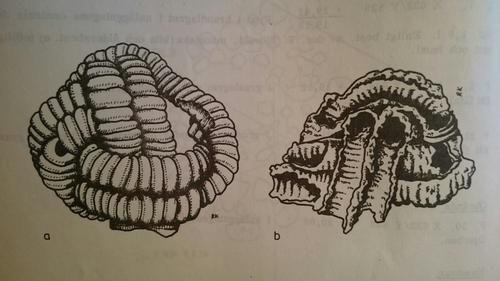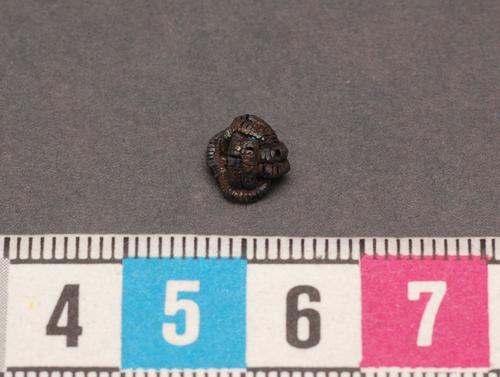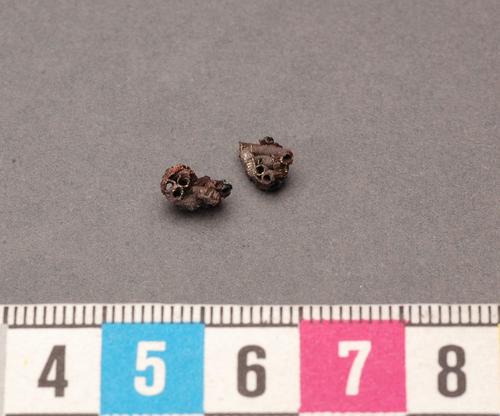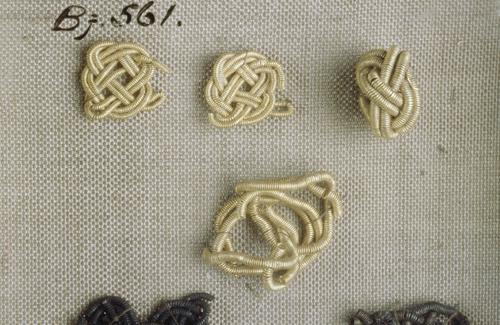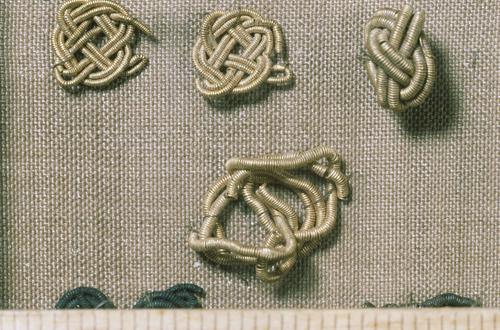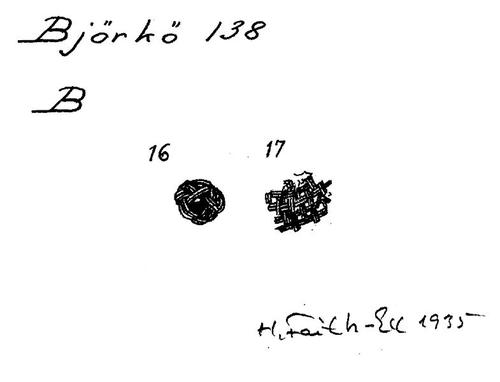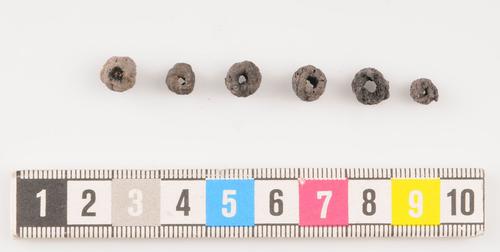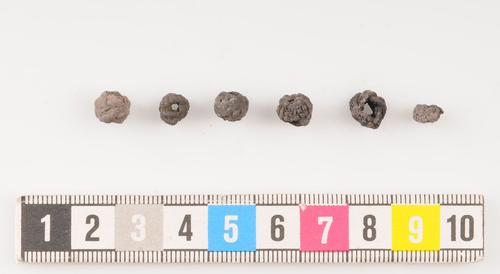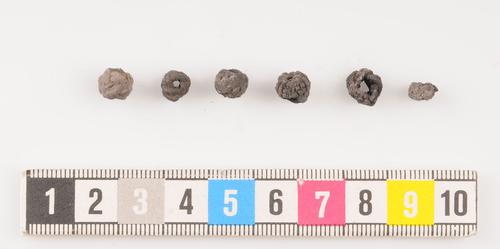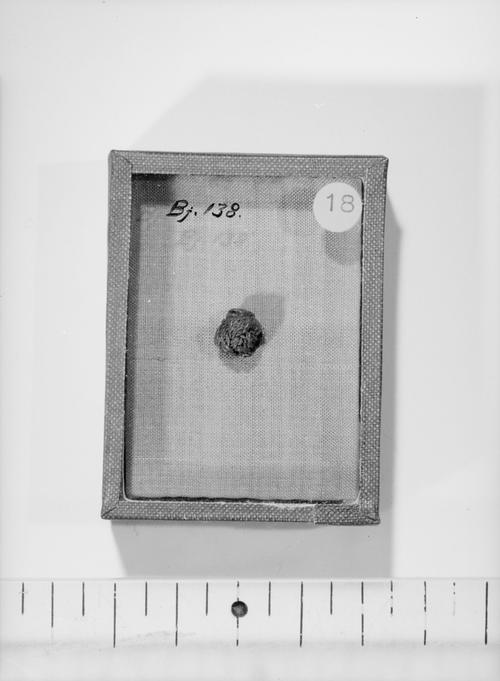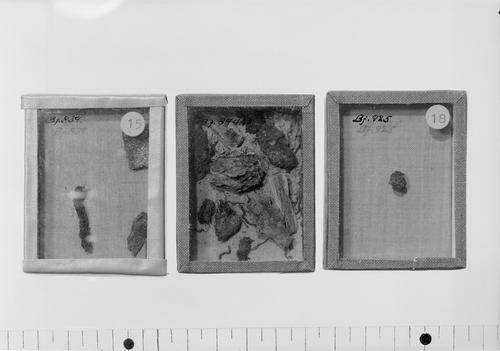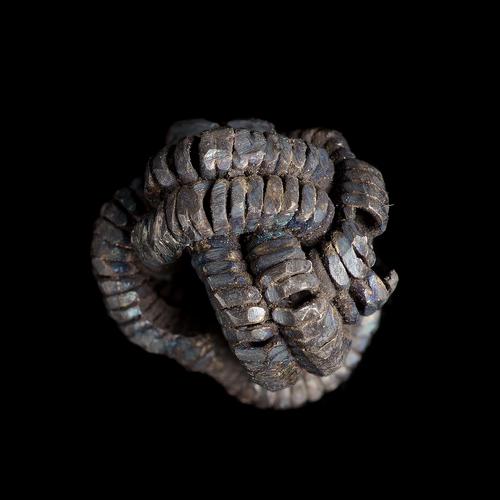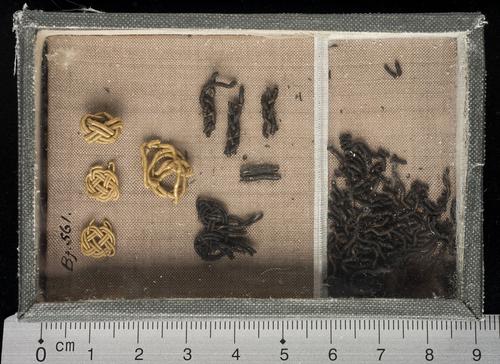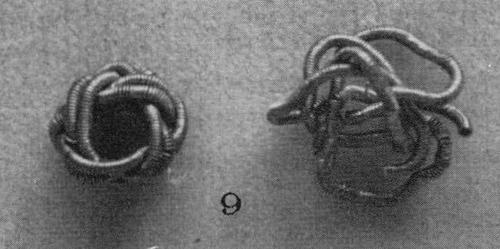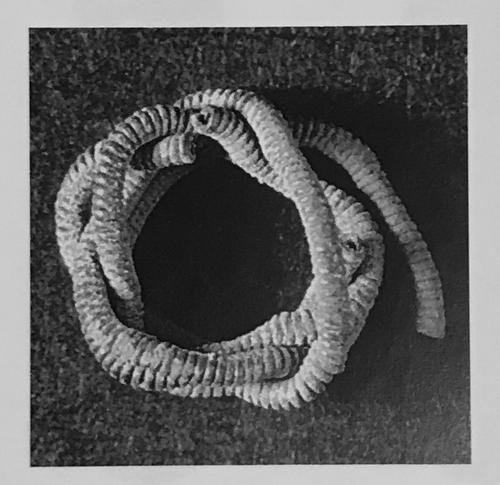P23
Sliding ring knot in double braiding
Found in graves
Texts
Source texts referencing P23
Original text (DE):
P 23. GRAB 561. Taf. 28: 9. Ein Paar Gleitknoten aus Spiralgoldfaden. Der Knoten ist aus einem einzigen Faden hergestellt, der 6 Mal herumläuft und den Effekt einer dreifachen Flechte mit 2 Fäden in jedem Part hervorruft. Masse: 8 x 8 x 4 mm. Der eine unbeschädigt, der andere ganz zerfallen.
English translation (AI generated):
P 23. GRAVE 561. Plate 28: 9. A pair of sliding knots made of spiral gold thread. The knot is made from a single thread, which runs around 6 times and creates the effect of a triple braid with 2 threads in each part. Dimensions: 8 x 8 x 4 mm. One undamaged, the other completely disintegrated.
Source texts referencing P23
Original text (DE):
GRAB 112 A. M. Brandgr. Gleitknoten aus Spiralsilber gleich P 23, obwohl weiter. Zerkrümelter Silberdraht, wahrscheinlich Reste eines gleichen Ringes.
English translation (AI generated):
GRAVE 112 A. Male. Cremation grave. Sliding knot made of spiral silver similar to P 23, although wider. Crumbled silver wire, probably remains of a similar ring.
Source texts referencing P23
Original text (DE):
GRAB 561. M. 10. Jhdt. Innerhalb eines 5-eckigen Platzes, den grössten Teil des Rumpfes bedeckend, wurden Teile von Gold- und Silberdraht gefunden, der letztere verwittert und über den ganzen Raum verstreut. Erhalten ist: Goldschuss eines Brettchenbandes, B 23, 2 Sorten; 2 flache Knoten, P 17; 2 Gleitknoten, P 23, aus Spiralgold (wahrscheinlich beim Wetzstein); Reste von Spiralsilber, die sowohl von einem Knoten wie P 22 wie auch von einer einfachen Flechte herrühren.
English translation (AI generated):
GRAVE 561. Male. 10th century. Within a pentagonal area, covering the largest part of the torso, parts of gold and silver wire were found, the latter weathered and scattered throughout the entire space. Preserved are: gold weft of a tablet-woven band, B 23, 2 types; 2 flat knots, P 17; 2 sliding knots, P 23, made of spiral gold (probably near the whetstone); remains of spiral silver, which originate both from a knot like P 22 as well as from a simple braid.
Source texts referencing P23
Original text (DE):
GRAB 925. Brandgr. Gleitknoten aus Spiralsilber gleich P 23.
English translation (AI generated):
GRAVE 925. Cremation grave. Sliding knot made of spiral silver similar to P 23.
Source texts referencing P23
Original text (SE):
På grund av vägomläggningar vid väg 226 undersökte och borttog Riksantikvarieämbetet UV, sommaren 1980, fornlämning RAÄ 154 i Huddinge sn, Södermanland. RAÄ 154 var ett gravfält från vikingatid som utgjordes av tre högar (A13, A14, A15), två omarkerade skelettgravar (A16, A18) och en osäker stensättning (A17). A14, A15 och A17 var delvis skadade av sentida nedgrävningar. Tillsammans med RAÄ 153, 160, 44 och troligtvis RAÄ 42 har RAÄ 154 utgjort en del av ett större gravfält. RAÄ 154 var beläget sydsydöst om Fullersta gård, ca 39-41 m ö h. Fynden från högarna bestod bl a lerkärl, keramik, brända ben, eldslagningsflinta, pärlor av glas och glasfluss, pärlor av silvertråd, tre hängen av silvertråd i form av posamentknutar, en torshammarring med påträdda ringar, kammar, fragment av järn och brons, bronsskållor, nitar, nubb och ett klippt silvermynt. Fynden i skelettgravarna utgjordes av lerkärl, fragment av järn och den återanvända knappen av ett vendeltida ryggknappspänne. Knappen, som består av brons och guld, hade en bevarad textilknut trädd genom bottenhålet och vilade på ett underlag av näver och fjäderrester. Accession har skett efter beslut av RAÄ enligt KML. Rapport: UV 1987:8. Gravarna vid Huddinge centrum – fragment av det förhistoriska Fullersta. Utarbetad av Marianne Foghammar-Summanen 1987. Handlingar i ATA.
English translation (AI generated):
Due to road realignments at road 226, the Swedish National Heritage Board (RAÄ) UV investigated and removed ancient monument RAÄ 154 in Huddinge parish, Södermanland, during the summer of 1980. RAÄ 154 was a Viking Age burial ground consisting of three mounds (A13, A14, A15), two unmarked skeleton graves (A16, A18), and an uncertain stone setting (A17). A14, A15, and A17 were partially damaged by recent excavations. Together with RAÄ 153, 160, 44, and probably RAÄ 42, RAÄ 154 formed part of a larger burial ground. RAÄ 154 was located south-southeast of Fullersta farm, approximately 39-41 meters above sea level. The finds from the mounds included clay vessels, ceramics, burnt bones, fire-striking flint, glass and glass flux beads, silver wire beads, three pendants of silver wire in the form of passementerie knots, a Thor's hammer ring with threaded rings, combs, fragments of iron and bronze, bronze bowls, rivets, studs, and a clipped silver coin. The finds in the skeleton graves consisted of clay vessels, fragments of iron, and the reused button of a Vendel period back-button brooch. The button, made of bronze and gold, had a preserved textile knot threaded through the bottom hole and rested on a base of birch bark and feather remains. Accession has taken place after a decision by RAÄ according to the Cultural Heritage Act (KML). Report: UV 1987:8. The graves at Huddinge center - fragments of prehistoric Fullersta. Prepared by Marianne Foghammar-Summanen 1987. Documents in ATA.
Source texts referencing P23
Original text (SE):
"1) Hög, undersökt och borttagen, 8 m diam och 0,7 m h. Bevuxen ikanten med en tall och i övrigt flera enbuskar.4 m SSÖ om nr 1 ärnr: 2) Hög, undersökt och borttagen, 6 m diam och 0,6 m h.Bevuxen med ett par tallar 1 m NV om nr 2 är nr: 3) Hög(?), restav, undersökt och borttagen. Nu återstår ett segment, 6x4 m(NÖ-SV) och 0,3-0,5 m h. Övertorvad. SSÖ om nr 2 är ettparoregelbundna, intill 0,2 m h, förhöjningar, möjligendemolerade fornlämningar" Beskrivning tagen från 1950-årsinventering. vid undersökningen 1980 undersöktes 6 gravar. Fynd:pärlor och hängen av silvertråd, pärlor av glas och glasfluss, 1vikt, nitar och skållor av brons, 1 torshammare av järn, 1 knivoch nitar av järn, fragment av benkammar, brända ben och kol,ryggknappsspänne av brons lerkärl, järnfragment. Datering:Högarna-vikingatid. Skelettgravarna-vendeltid? ev senare. T
English translation (AI generated):
"1) Mound, investigated and removed, 8 m diameter and 0.7 m high. Grown at the edge with a pine tree and otherwise several juniper bushes. 4 m SSE of no. 1 is no: 2) Mound, investigated and removed, 6 m diameter and 0.6 m high. Grown with a couple of pine trees. 1 m NW of no. 2 is no: 3) Mound(?), remains of, investigated and removed. Now remains a segment, 6x4 m (NE-SW) and 0.3-0.5 m high. Covered with turf. SSE of no. 2 are a couple of irregular elevations, up to 0.2 m high, possibly demolished ancient monuments" Description taken from the 1950s inventory. During the investigation in 1980, 6 graves were examined. Finds: beads and pendants of silver wire, beads of glass and glass paste, 1 weight, rivets and scales of bronze, 1 Thor's hammer of iron, 1 knife and rivets of iron, fragments of bone combs, burnt bones and charcoal, back-button brooch of bronze, pottery, iron fragments. Dating: The mounds - Viking Age. The skeleton graves - Vendel Period? possibly later. T
Source texts referencing P23
Original text (DE):
Ein fragmentierter Posamentknoten aus gezogenem, in eine feine Spirale gedrehtem Silberdraht (Abb. 86.4) hat ein Loch in der Mitte (Durchmesser 4,5—5 mm) und dürfte auf eine Schnur oder ein Band aufgezogen gewesen sein (äußerer Querschnitt des Knotens 8 mm; Stärke des Silberdrahtes 0,2 mm; Stärke des Spiraldrahtes 0,8 mm).
English translation (AI generated):
A fragmented posament knot made of drawn silver wire twisted into a fine spiral (Fig. 86.4) has a hole in the middle (diameter 4.5-5 mm) and was likely threaded onto a cord or band (outer cross-section of the knot 8 mm; thickness of the silver wire 0.2 mm; thickness of the spiral wire 0.8 mm).
Source texts referencing P23
Original text (DE):
In Kammergrab 188/1960 wurde ein silbernes Posamentknötchen (Abb. 86.4) — und Reste eines zweiten? — geborgen. Das Knötchen, in zwei Teile zerbrochen, dürfte im Querschnitt ca. 8 mm gemessen haben. Es setzt sich aus einem einzigen, vier Mal umlaufenden und um ein mittleres Loch zu einem Knoten (Breite 4,5—5 mm) gedrehten Faden zusammen. Dieser Faden (Stärke 0,8 mm) besteht aus einem gezogenen Silberdraht (Stärke 0,2 mm), der um eine Seele aus jetzt vergangener Seide oder Leinen gewickelt war.
English translation (AI generated):
In chamber grave 188/1960, a small silver posament knot (Fig. 86.4) — and remains of a second? — was recovered. The knot, broken into two parts, would have measured approximately 8 mm in cross-section. It is composed of a single thread, wound around four times and twisted around a central hole to form a knot (width 4.5-5 mm). This thread (thickness 0.8 mm) consists of drawn silver wire (thickness 0.2 mm) that was wrapped around a core of now-decomposed silk or linen.
Source texts referencing P23
Original text (DE):
Unter den Knoten in Birka dürfte der aus einem Faden gearbeitete Typ P 23 dem Beispiel aus Haithabu am ehesten entsprechen. Gleitknoten kommen vor allem als Verzierung von Bändern und Schnüren an wertvollen Taschen und Beuteln vor. Eine derartige Verwendung ist auch für das Exemplar aus Haithabu anzunehmen.
English translation (AI generated):
Among the knots in Birka, the type P 23 made from a single thread would most closely correspond to the example from Haithabu. Sliding knots appear primarily as decoration on bands and cords of valuable bags and pouches. Such a use can also be assumed for the specimen from Haithabu.
Source texts referencing P23
Original text (DE):
Interessanterweise gab es in diesem Grab auch einen Pfriem, dessen Holzgriff mit Spiralsilberdraht umwickelt ist. Die Stärke des Silberdrahtes (0,2 mm) und des gesponnenen Drahtes (0,8 mm) stimmt genau mit der Fadenstärke im Posamentknoten überein. Vom gleichen Typ sind die Spiraldrahtumwicklung eines Messers aus Grab 204/1960, verschiedene Spiralsilberzierate aus Grab 27/1963 und — ohne sichere Zuordnung — ein Stein mit einer Umfassung aus Spiralsilberdraht.
English translation (AI generated):
Interestingly, this grave also contained an awl whose wooden handle is wrapped with spiral silver wire. The thickness of the silver wire (0.2 mm) and the spun wire (0.8 mm) exactly matches the thread thickness in the posament knot. Of the same type are the spiral wire wrapping of a knife from grave 204/1960, various spiral silver ornaments from grave 27/1963, and — without secure attribution — a stone with a frame made of spiral silver wire.
Source texts referencing P23
Original text (DK):
Det er knuder knyttet af spiralsnoede sølvtråde. Stykkerne (nr. 81 og 501) synes at have været ganske ens; det bedst bevarede (nr. 501 på fotografiet fig. 69) er kun 1,6cm bredt. Det drejer sig her om rester af knudeborder af sølvsnore, af den slags som kendes i flere variationer fra grave ved Birka i Sverige.
English translation (AI generated):
These are knots tied from spiral-twisted silver threads. The pieces (no. 81 and 501) appear to have been quite similar; the best preserved (no. 501 in the photograph fig. 69) is only 1.6 cm wide. These are remains of knot borders made of silver cords, of the kind known in several variations from graves at Birka in Sweden.
